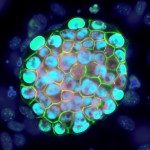Link to Pubmed [PMID] – 26534985
Development 2015 Nov;142(21):3649-60
NOTCH signalling is an evolutionarily conserved pathway involved in intercellular communication essential for cell fate choices during development. Although dispensable for early aspects of mouse development, canonical RBPJ-dependent NOTCH signalling has been shown to influence lineage commitment during embryonic stem cell (ESC) differentiation. NOTCH activation in ESCs promotes the acquisition of a neural fate, whereas its suppression favours their differentiation into cardiomyocytes. This suggests that NOTCH signalling is implicated in the acquisition of distinct embryonic fates at early stages of mammalian development. In order to investigate in vivo such a role for NOTCH signalling in shaping cell fate specification, we use genetic approaches to constitutively activate the NOTCH pathway in the mouse embryo. Early embryonic development, including the establishment of anterior-posterior polarity, is not perturbed by forced NOTCH activation. By contrast, widespread NOTCH activity in the epiblast triggers dramatic gastrulation defects. These are fully rescued in a RBPJ-deficient background. Epiblast-specific NOTCH activation induces acquisition of neurectoderm identity and disrupts the formation of specific mesodermal precursors including the derivatives of the anterior primitive streak, the mouse organiser. In addition, we show that forced NOTCH activation results in misregulation of NODAL signalling, a major determinant of early embryonic patterning. Our study reveals a previously unidentified role for canonical NOTCH signalling during mammalian gastrulation. It also exemplifies how in vivo studies can shed light on the mechanisms underlying cell fate specification during in vitro directed differentiation.

